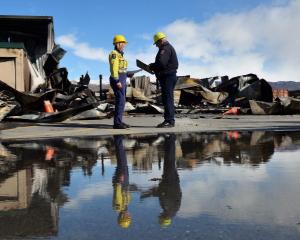The Fakava family agreed to the four-hour open home so the public could see the effects of a fast-moving, explosive fire.
The cause of the blaze, which destroyed most of the upper floor, is still being investigated.
More than 600 people filed through the house, which is likely to be demolished.
Firefighters and fire safety officers were on hand, informing people about the October 6 fire, and emphasising the fire safety message.
Mrs McBride said seeing the charred wreck, to which she took her two daughters and son, and smelling the remnants of the family's possessions, was a good wake-up call.
She had read about house fires in the newspaper, and then "that's it", it had no lasting impact.
But touring the wreck on Saturday had left a strong impression.
Mosgiel man Deon Vosloo said Saturday was an "awesome" opportunity for people, most of whom did not understand how quickly fires could take hold.
"I shudder to think what would have happened if this had been in the middle of the night."
St Kilda Acting Station Officer Martin Jansen said an explosion occurred because of a mix of gas, not just from an lpg cylinder which vented, but other fuel sources, too.
Many people did not realise their couches - where the fire started - were a fuel source, containing up to 30 litres of petrol because of the foam content.
When a large south-facing window blew out the fire had plenty of oxygen, another key ingredient in a fast-moving fire.
Mr Jansen had attended the blaze and said Dunedin had only one or two such fires a year.
Such fires "take no prisoners".
About the only thing people could do was shut doors to contain it, get out, and call for help, he said.
Fire safety officer Barry Gibson said people should not try to extinguish fires, as the Fakavas had.
The "incredibly successful" open day was not about frightening the public, but informing them about how to protect themselves.
As well as closing doors to contain the flames, people could place lids over cooking fires, which was an effective way to limit damage.
Having an operational fire alarm in every room was also essential.
House owner Senita Fakava, who was on his way home from work when the blaze engulfed his house, said the house was likely to be demolished.
The family planned to rebuild.
The Fakavas were touched by many offers of help from the community, which included gifts of furniture, and a new cellphone for his daughter Aloma.
Miss Fakava (19) had been at the house with her cousin Dina Vakuti, and her cousin's child when the blaze started.
During the open day, the Fakava family and their friends cooked sausages for the public.




